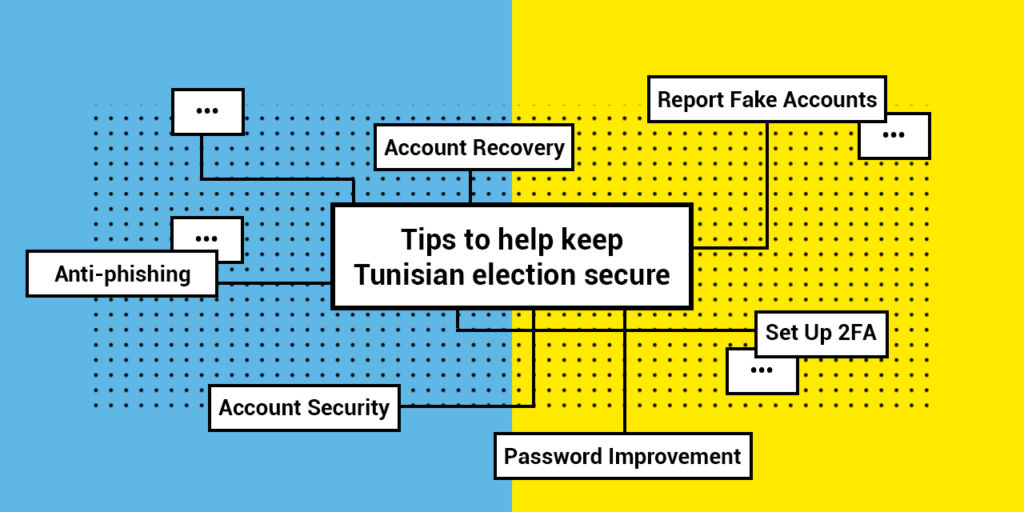En français.
If you are a part of the vital conversations taking place online ahead of the elections, you or your followers could become unwitting targets for those seeking to influence election outcomes. The lack of strong data protection laws in Tunisia, and the lack of transparency by social media platforms like Facebook, make it easier to exploit our data for political manipulation. Candidates are investing massively in targeted ad campaigns, and in many cases, it’s not clear who is behind the ads and whether you should trust the information you see. At the same time, bad actors can use other tactics for manipulation, such as hacking or taking over your organization’s Facebook account, deploying “trolls” to spread false or misleading information, or even launching an attack on a website or platform that you use, silencing your community.
But here’s the good news: there are simple actions that you — yes, you — can take to reduce these risks, mitigate the impact of attacks, and help protect the integrity of Tunisian elections. Even better, while data protection and digital security are extremely serious issues — especially during elections — increasing your digital security doesn’t have to be hard. In fact, it can even be fun.
Our Digital Security Helpline has prepared a set of tips to help citizens and civil society globally increase digital security. To remove the barriers to taking action, we’ve created a series of shareable animated cards that use humor to deliver the tips. Our goal is to reach as many Tunisians as possible with a simple message: even in the face of potential online attacks, you can make a positive difference for election integrity. By using and sharing these tips, you can increase digital security and help protect your community and your democracy. (Stay tuned for these cards in French.)
Blue cards (Tip Set 1): Secure your online accounts
For anyone who manages a social media account in Tunisia, the consequences of getting hacked are enormous. In the 2016 U.S. presidential elections, leaked data from 50 million Facebook accounts were used to create voter profiles and launch targeted campaigns, and serious questions remain about how much Russia may have influenced the outcome. Today, Tunisian elections remain vulnerable to such attacks. Hackers could use your account to impersonate you, spread disinformation, or get access to data for leaking.
Yellow cards (Tip Set 2): Report interference, thwart disinformation, and stay online and connected
Across the globe, our Digital Security Helpline often sees online attacks increase in the months and weeks surrounding elections. In Tunisia, it’s vital to ensure that hackers do not gain control of accounts or impersonate the account holders in an attempt to sway public opinion — and if they do, that these accounts are recovered and their followers are notified. It’s also critical that the public maintains full access to information online, and that “DDoS” attacks, website blocking, internet shutdowns, or other acts of deliberate censorship do not interfere with free democratic discourse.
Here are the two sets of cards, designed by Access Now’s Juliana Castro. Click each tab to view the tip cards.
[tabs class=”tip1″]
[tab class=”tip1″ title=”Tip 1.1″ anchor=”tip1″]
[/tab]
[tab class=”tip1″ title=”Tip 1.2″ anchor=”tip1″]
[/tab]
[tab class=”tip1″ title=”Tip 1.3″ anchor=”tip1″]
[/tab]
[tab class=”tip1″ title=”Tip 1.4″ anchor=”tip1″]
[/tab]
[tab class=”tip1″ title=”Tip 1.5″ anchor=”tip1″]
[/tab]
[tab class=”tip1″ title=”Tip 1.6″ anchor=”tip1″]
[/tab]
[tab id=”tip 2.1″ title=”Tip 2.1″ anchor=”tip 2″]
[/tab]
[tab id=”tip 2.2″ title=”Tip 2.2″ anchor=”tip 2″]
[/tab]
[tab title=”Tip 2.3″ anchor=”tip 2″]
[/tab]
[tab title=”Tip 2.4″ anchor=”tip 2″]
[/tab]
[tab title=”Tip 2.5″ anchor=”tip 2″]
[/tab]
[/tabs]
